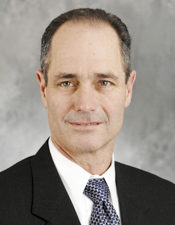Business relief package agreed to; DFL members offer more proposals

Assistance for small-business owners hurting due to the COVID-19 pandemic may not be the only item up for debate during next week’s special session.
Heard Thursday by the House Ways and Means Committee was a series of DFL proposals that includes financial assistance for businesses and child care providers, additional benefits for the unemployed, housing help and a one-time cash benefit for certain low-income households. No action was taken.
Most funding would come from the General Fund.
Released last week, the state’s latest budget forecast shows a projected $641 million surplus for the current biennium that ends June 30, 2021.
“The goal is to have a heads-up in terms of what may be discussed for (Monday’s) special session,” said Rep. Lyndon Carlson Sr. (DFL-Crystal), the committee chair. “I think it’s fair to say that conversations are still taking place.”
Helping Minnesota businesses
The proposal that carries the largest financial commitment — $216.5 million — aims to help businesses that have experienced at least a 30 percent sales decline since 2019.
Rep. Tim Mahoney (DFL-St. Paul) put forth an aid package that would provide:
- $102.5 million for counties to make grants to eligible businesses and nonprofits. Each county would receive the greater of $200,000 or a per capita amount based on its 2019 population;
- $100 million to businesses that provide on-site food and beverages; including bars, restaurants, breweries and wineries; bowling alleys; and fitness or sports recreation centers. Payment amounts would be based on the number of workers; and
- $14 million for movie theaters and multipurpose convention centers with a capacity of at least 1,500 people. A per screen formula would be used to help movie theaters and several factors would be considered for convention center allocations. Convention center awards would need to be used for direct operations and facility upkeep.
Money could start being allocated before the year ends.
At a news conference, Sen. Eric Pratt (R-Prior Lake), chair of the Senate jobs committee, said there is agreement with the House DFL and Senate Republicans on this.
“We know that there’s more things to it, but this was the foundation of our business grant relief program with the details businesses are really looking for,” added Rep. Dave Baker (R-Willmar). “But there’s going to be other components to make the package come together.”
[WATCH: Pratt and Baker news conference]
Mahoney also outlined a plan for up to an additional 13 weeks of unemployment benefits for someone who exhausts their regular unemployment benefits, state extended benefits or federal extended benefits.
Mahoney said between 100,000-125,000 Minnesotans are slated to lose unemployment benefits Dec. 26 without a state or federal extension. If a federal extension is enacted, all that money would be used first.
"There is no separation for me between the workers and the businesses. We need to take care of both. Or both of them will go down,” Mahoney said.
Rep. Pat Garofalo (R-Farmington) said he doesn’t understand how extending unemployment benefits became controversial.
“The unemployment insurance system is insurance. … Why shouldn’t we want to be responsible and always make sure we’re responsible stewards of these dollars? It’s important to recognize there are a lot of people who need this help.”
However, differences remain. For example, the Senate wants just a five-week extension, the bodies differ on the end date and the Senate puts a $200 million cap on the total amount.
“I hope between now and Monday we can come up with a win-win situation,” Carlson said.
A separate Mahoney proposal calls for shortening from 12 months to three months the length of employment requirement for an employee to participate in a shared work program.
Cash benefit for low-income Minnesotans
To assist low-income families with children, Rep. Mohamud Noor (DFL-Mpls) offered a proposal to take $15.71 million in TANF funds “to provide a onetime cash benefit of up to $500 for each household active in the Minnesota family investment program or diversionary work program.”
“This is an opportunity to make sure that no one is left out in Minnesota,” Noor said. “ … These Minnesotans are struggling at this moment of need with the economic crisis, with the health crisis. We need to stand up for every family, for every individual so that we can show we are one Minnesota, we care about each other and we stand for each other.”
He noted that the money would be spent immediately in local communities, thereby helping local businesses as well.
“They have not seen a reduction in the amount of MFIP that they receive. This would be additional money on top of what they already receive,” House Minority Leader Kurt Daudt (R-Crown) said at a morning forum of legislative leaders hosted by Fredrikson & Byron, P.A. “We’re certainly reviewing that. It’s possible it could be included, but the past few times that we’ve reviewed it both our caucus and the Senate Republicans have agreed not to move forward with that.”
Will it get done?
“I’m confident we’ll be able to come together by Monday to pass a package to help Minnesotans,” House Speaker Melissa Hortman (DFL-Brooklyn Park) said at the forum.
Gov. Tim Walz said last week he would like to see lawmakers pass $300 million to $600 million in state assistance.
“Minnesota’s small businesses and workers are bearing a large burden of the COVID-19 pandemic in order to protect their entire community amid restrictions that are saving lives,” Walz said in a statement calling Monday’s special session. “I call upon our state legislature to come together and ensure our businesses stay afloat, our workers are supported, and our families can put food on the table.”
Also heard were plans to:
- appropriate $53.1 million for additional support funds for eligible child care providers in December, January and February. Since July, the Department of Human Services has used federal CARES Act money to provide funds to help child care providers implement state and federal public health guidance related to COVID-19;
- spend $50 million for emergency housing assistance aimed at preventing homelessness and helping maintain home ownership;
- fund a COVID-19 food relief grant program with a $10 million appropriation “to provide economic support to Minnesota owned and operated restaurants, catering companies, and food establishments that employ the equivalent of 50 or fewer full-time employees and operate five or fewer locations while also providing hunger relief to Minnesotans impacted by COVID-19, including people experiencing food insecurity”;
- modify the state’s basic sliding fee program — that helps families pay for child care while they work, look for work, or attend training or school to prepare for work — with a $9.98 million appropriation;
- extend from Dec. 31, 2020 to June 30, 2021 the end date of the COVID-19 Minnesota fund used “to pay expenditures related to a peacetime emergency … that relates to the infectious disease known as COVID-19”;
- temporarily waive certain fees, including a permit for alcohol sales after 1 a.m.; late license fees for food retailers, food manufacturers, food wholesalers and food brokers; and the Metropolitan Council would refund the wastewater permit fee to any brewer that produces fewer than 20,000 barrels per year;
- correct a date to a previously passed Environment and Natural Resources Trust Fund law; and
- update a law passed in October that provided an 8.4 percent pay increase for state troopers to include the same increase to some employees whose exclusive representative is the Minnesota Law Enforcement Association. This would be Bureau of Criminal Apprehension agents, special agents in the gambling enforcement division, fugitive specialists in the Corrections Department, conservation officers with the Department of Natural Resources and commerce insurance fraud specialists at the Department of Commerce.
Related Articles
Search Session Daily
Advanced Search OptionsPriority Dailies
Ways and Means Committee OKs proposed $512 million supplemental budget on party-line vote
By Mike Cook Meeting more needs or fiscal irresponsibility is one way to sum up the differences among the two parties on a supplemental spending package a year after a $72 billion state budg...
Meeting more needs or fiscal irresponsibility is one way to sum up the differences among the two parties on a supplemental spending package a year after a $72 billion state budg...
Minnesota’s projected budget surplus balloons to $3.7 billion, but fiscal pressure still looms
By Rob Hubbard Just as Minnesota has experienced a warmer winter than usual, so has the state’s budget outlook warmed over the past few months.
On Thursday, Minnesota Management and Budget...
Just as Minnesota has experienced a warmer winter than usual, so has the state’s budget outlook warmed over the past few months.
On Thursday, Minnesota Management and Budget...

